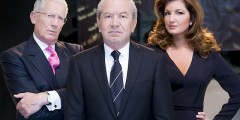A Christmas message: Bacon and turkey not necessarily a recipe for continuing success
December 18, 2013
We are all familiar with the terms “hiding in plain sight” and “can’t see the wood for the trees”. Depending on one’s viewpoint, it is either fitting or unfortunate that both have become such tired tropes, because they are rather useful in discussing the merits of original thought. It was Francis Bacon (1561 – 1626) …
Stifling creativity is self-defeating
November 28, 2013
By Paul Kirkham Writing to his rival and fellow polymath Robert Hooke in 1676, Isaac Newton famously remarked: “If I have seen further it is by standing on the shoulders of giants.” What he meant, of course, was that his own achievements were made possible by those of his predecessors. Newton, though, wasn’t the first …
The ivory tower cannot compete with the cathode ray
September 9, 2013
The latest series of the UK television series The Apprentice followed the established pattern of its predecessors, relying on clever editing to make a succession of would-be entrepreneurs appear largely irrational, argumentative and sometimes idiotic. For good measure, the inclusion of numerous conspicuously photogenic contestants has seen accusations of “sexing up” added to the traditional …
How to encourage innovation
July 8, 2013
By Simon Mosey, Director of the Haydn Green Institute for Innovation and Entrepreneurship. Cost-cutting might solve cash flow problems in the short-term, but it does nothing to encourage sustainable growth. To achieve this, companies need to encourage new ideas and develop them into successful innovations and this requires a willingness to do something differently. It’s …
Think you’re an entrepreneur in the making? It’s not as easy as it looks on TV…
June 24, 2013
By Dr Janine Swail TV programmes like Dragons’ Den and The Apprentice depict entrepreneurial activity unrealistically and set budding entrepreneurs up for a fall, according to a new report published in the International Small Business Journal. Dr Janine Swail, lecturer in Innovation and Entrepreneurship at The University of Nottingham, co-authored the report with Professors Simon …
Business schools should be wary of producing MBA ‘heroes’
By Paul Kirkham, Nottingham University Business School Producing MBA graduates who aim high and are committed to making a difference is a key function of any business school. What we must be increasingly careful to avoid, however, is the temptation to produce what we might call “heroes”. Ken Kesey, author of One Flew Over the …











Recent Comments